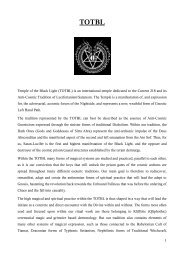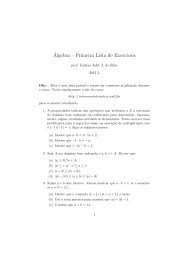Satanism Today - An Encyclopedia of Religion, Folklore and Popular ...
Satanism Today - An Encyclopedia of Religion, Folklore and Popular ...
Satanism Today - An Encyclopedia of Religion, Folklore and Popular ...
Create successful ePaper yourself
Turn your PDF publications into a flip-book with our unique Google optimized e-Paper software.
Aquinas, Thomas 13<br />
in the third part consider Christ <strong>and</strong> his sacraments<br />
as indispensable means to salvation.<br />
According to Thomas Aquinas, salvation is<br />
possible through scriptural knowledge, which<br />
contains certain truths that exceed human reason<br />
<strong>and</strong> can be accepted only on faith. Human beings<br />
cannot directly know God’s essence, which transcends<br />
all species <strong>and</strong> genera. God’s existence can<br />
be proved in five ways that employ the principle<br />
<strong>of</strong> causality <strong>and</strong>, starting from the empirical<br />
knowledge <strong>of</strong> the physical world, include the<br />
argument from motion, the argument from<br />
nature <strong>of</strong> efficient cause, the argument from<br />
possibility <strong>and</strong> necessity, the argument from the<br />
gradations <strong>of</strong> perfection to be found in things,<br />
<strong>and</strong> finally the argument from the order <strong>of</strong> the<br />
world. All these arguments imply the principle<br />
that reason needs a final stopping point in any<br />
chain <strong>of</strong> explanation, which must be outside <strong>of</strong><br />
the series itself <strong>and</strong> be <strong>of</strong> a different nature—that<br />
is the nature <strong>of</strong> God.<br />
Thomas Aquinas maintains that God’s simultaneous<br />
presence occurs in all things as the source<br />
<strong>of</strong> their being, power, <strong>and</strong> operation. God’s<br />
essence, defined as an immutable pure act, cannot<br />
be fully understood by the created intellect, unless<br />
God makes himself intelligible to it through his<br />
grace, a foretaste <strong>of</strong> eternal life in heaven that is<br />
expressed in good works <strong>and</strong> in the exercise <strong>of</strong> all<br />
the virtues. Only those who possess the more<br />
divine grace will be able to see God more perfectly,<br />
<strong>and</strong> they will be the more beatified.<br />
Aquinas asserts that God cannot be seen in his<br />
essence by a mere human being, but the goals <strong>of</strong><br />
beatific vision <strong>and</strong> ultimate happiness, which have<br />
an eternal nature <strong>and</strong> cannot be lost once attained,<br />
can be achieved only by the separation from mortal<br />
life. The third part <strong>of</strong> the Summa deals with immortal<br />
life, which humanity reaches through the Savior<br />
by the Resurrection, when the soul is rejoined to the<br />
body. Death is a necessary circumstance in the<br />
process whereby human beings, even the people<br />
alive at the end <strong>of</strong> the world, become immortal. All<br />
people are directed to one last fixed end, <strong>and</strong> after<br />
death both intellect <strong>and</strong> will <strong>of</strong> all the dead, whether<br />
they are in hell, purgatory, or in heaven, whether<br />
before or after resurrection, become immutable <strong>and</strong><br />
they are brought to eternity.<br />
According to Aquinas, the localities <strong>of</strong> life after<br />
death are: Limbus Patrum, where the good went<br />
who died before Christ; Limbus Infantum, where<br />
are allocated the children who died unbaptized;<br />
Purgatory, the place where all sinners stay until<br />
they are purified or redeemed by the church, or<br />
until the last day; Hell, or Gehenna, where the<br />
wicked are condemned; <strong>and</strong> finally Heaven, where<br />
the good are admitted. At the day <strong>of</strong> judgment, all<br />
the souls will reassume their bodies. The intermediate<br />
states will then be destroyed <strong>and</strong>, when the<br />
last sentence is pronounced, the condemned will<br />
depart for hell <strong>and</strong> the good will go to heaven<br />
forever, while the souls in purgatory may be<br />
redeemed <strong>and</strong> transferred to heaven through the<br />
prayers <strong>of</strong> the living for them, <strong>and</strong> the transfer <strong>of</strong><br />
good works to their account.<br />
Aquinas accepted the tradition that Satan <strong>and</strong><br />
his demons were fallen angels. His view <strong>of</strong> angels<br />
was based on the assumption that humans cannot<br />
be the highest beings in the created order. <strong>An</strong>gels<br />
were thus a race <strong>of</strong> superior beings characterized by<br />
capacities far beyond our own. He asserted that<br />
angels are the next step in the order <strong>of</strong> being beyond<br />
humanity. Aquinas also argued that since intellect is<br />
above sense, there must be some creatures who are<br />
incorporeal <strong>and</strong> therefore comprehensible by the<br />
intellect alone. He thus assigned to angels an incorporeal<br />
nature, departing from earlier philosophers<br />
who had asserted that angels were constituted from<br />
a subtle material substance. In spite <strong>of</strong> their incorporeal<br />
nature, angels can sometimes assume bodies,<br />
since the scriptural account <strong>of</strong> Abraham’s entertaining<br />
angels makes this plain.<br />
At the time, it was generally recognized by the<br />
church that the angels were impeccable. Their<br />
state <strong>of</strong> perfection is such that they are unable to<br />
sin as men <strong>and</strong> women do. Aquinas held that<br />
Lucifer, like all the angels, was created in a state <strong>of</strong><br />
grace. Nevertheless, he exercised the free will with<br />
which all angels are endowed in a wrong direction.<br />
Otherwise he could not have sinned since, according<br />
to Aquinas, angels achieve everlasting bliss the<br />
instant they do one meritorious act, <strong>and</strong> thereafter<br />
they are so close to God that it is impossible for<br />
them to turn away from him. Hence, the angels<br />
who did not rebel can never sin.<br />
In some places, Aquinas expressed pity for the
















